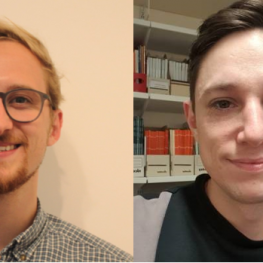Start
19 April 2022 - 12 h 30 min
End
19 April 2022 - 12 h 30 min
Address
50 avenue Franklin Roosevelt, Unité de Psychologie Sociale CP122. Campus du Solbosch, bâtiment D, 8e étage, salle de séminaire (DC8.322). View mapCategories
Departement SeminarFighting fire with fire: The positive Effects of Being Exposed to Meta-Conspiracy Theories
Mikey Biddlestone (Postdoctoral researcher, Cambridge, UK)
Abstract. Effective interventions to reduce susceptibility to conspiracy beliefs appear to be blossoming, drawing attention to a number of important concerns. In this ongoing research, we hope to extend methods of psychological inoculation (small doses of conspiracy theories to confer psychological immunity) to be most appealing to those high in conspiracy mentality. We hope to do this by framing conspiracy-refuting information in a conspiratorial manner, in other words, fighting fire with fire. In cross-sectional Study 1 (N = 555), we found that although COVID-19 vaccine conspiracy beliefs and COVID-19 vaccine meta-conspiracy beliefs (i.e., the conspiracy theory is a conspiracy) were positively correlated, accounting for their overlap in variance revealed that COVID-19 vaccination intentions were negatively predicted by COVID-19 vaccine conspiracy beliefs, but positively predicted by COVID-19 vaccine meta-conspiracy beliefs. In experimental Study 2 (N = 720; pre-registered), we exposed participants to COVID-19 vaccine conspiracy theories, alongside COVID-19 vaccine meta-conspiracy theories, alone or as pre- and de-bunks (vs. control). We found that presentation of the COVID-19 vaccine meta-conspiracy theories alone and as pre- and de-bunks increased belief in COVID-19 vaccine meta-conspiracy theories without increasing COVID-19 vaccine conspiracy beliefs (vs. control). Additional analyses revealed tentatively promising effects for COVID-19 vaccination intentions, with the pre-bunk condition appearing most effective among those displaying moderate and high levels of conspiracy mentality. We discuss implications, methodological limitations, and possibilities for future studies.
The social costs and benefits of sharing conspiracy theories
Ricky Green (Postdoctoral researcher, Kent, UK)
Abstract. Conspiracy theories are widely viewed as stigmatized beliefs, and it is often assumed that sharing conspiracy theories will therefore have negative reputational consequences for individuals. In five studies we examined the impression management costs and benefits of sharing conspiracy theories. In Experiment 1 (N = 354), participants perceived that people would avoid conspiracy theories when they wanted to create a favorable impression on others, but would share them to create a less favorable impression. We replicated this finding in Experiment 2 (N = 137), but also found potential benefits of sharing conspiracy theories. Specifically, participants perceived that individuals would share conspiracy theories to appear more unique (vs. average), and radical (vs. mainstream). In Experiments 3a, 3b and 4 (Ns = 248, 250 and 417), the latter pre-registered, we found that these perceptions are somewhat justified. Fictitious politicians who shared conspiracy theories (vs. refuted them) were perceived to be less predictable and competent, but also in some cases more of a “rogue” political outsider who is likely to effectively bring change. These differences were largely moderated by right-wing attitudes (Experiment 3a, Experiment 4) and pre-existing endorsement of conspiracy theories (Experiment 4). In Experiment 5, we examine similar impressions of someone who communicates conspiracy theories in their dating profile. We discuss the importance of examining conspiracy theories from this communicative perspective, and explore some ideas for future research.
The seminar will take place at the center as well as in this virtual seminar room.


